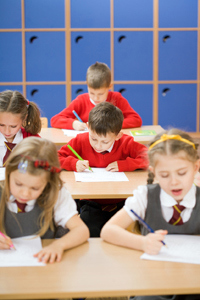What is the Primary School Curriculum?
An explanation of how schools decide what to teach in Years 5 to 11
If you’d like a PDF version of this page, simply click Primary School Curriculum PDF
If you are wondering how primary schools choose what they teach during KS1 (age 5 to 7) and KS2 (age 7 to 11) you can get an overview by following the links.
How do they decide the subjects to teach and the topics within each subject? Do they draw them out of a hat? Well, no – it’s a bit more organised than that! For most primary schools, what they teach has already been decided by the Government. They follow the National Curriculum.
What is the National Curriculum?
The National Curriculum is the programmes of study (i.e. subjects and topics) different age groups should be taught.
The National Curriculum isn’t set in stone. It changes over time with new topics being added and old ones removed. Most of the current National Curriculum was introduced in 2014, and some small changes were made the following year.
The National Curriculum applies to all children in local authority-maintained schools. So, between the ages of 5 and 16, most children’s learning follows the guidelines set by the Government.
The National Curriculum was first introduced in 1988 for all state schools in England, Wales and Northern Ireland (Scotland chose its own curriculum). Since then, education has become a matter for devolved government and the National Curriculum now only applies to English schools.
Why do we Need the National Curriculum?
The reason we have the National Curriculum is to standardise education throughout the country. It ensures that children of the same age are taught the same things, no matter which state-school they attend. This helps when families move between towns. If all schools cover the same topics, then a change from one to another shouldn’t affect a child’s education too much.
Apart from subjects taught and topics covered, the National Curriculum also sets out how children should be tested and the standards they should achieve. This helps to evaluate schools - if they are all teaching the same things and testing in the same way, how their students’ perform can be easily compared.
Must every Child’s Education Follow the National Curriculum?
Though it’s compulsory in all local authority-maintained schools, the National Curriculum is not followed by every school. Some are free to choose their own curriculums – independent (or private) schools, free schools and academies. If you home-educate your children you can also choose not to follow the National Curriculum, though it does provide a good framework for you.
The vast majority of primary schools are run by local authorities and so do follow the National Curriculum. Approximately 15% of primary schools in England are academies or free schools and, even though it’s not obligatory, most of these teach the National Curriculum.
Most pupils in primary schools are taught KS1 and KS2, which are parts of the National Curriculum.
What are Key Stages?
The National Curriculum is divided into four key stages (KS1 to KS4). KS3 and KS4 are taught in secondary schools. In primary schools KS1 is taught to pupils in Years 1 and 2 and KS2 to children in Years 3, 4, 5 and 6. At the end of every key stage pupils are tested and assessed to see how well they are doing and whether they have reached the desired standard.
Which Subjects are Taught in Primary Schools?
The National Curriculum sets out which subjects primary school children are taught. There are 10 subjects which must be covered in both KS1 and KS2. Here’s the list in full:
- English
- Maths
- Science
- History
- Geography
- Art and design
- Music
- Design and technology
- Physical education (which must include swimming)
- Computing (often called information and communication technology or ICT)
Religious education is also on the National Curriculum and all state-maintained schools have to teach it. Lessons should cover a range of religions, not just one. However, if parents don’t wish their child to be taught about religious beliefs different to their own, they can choose to exclude their children from these lessons.
In KS2, ancient and modern foreign languages must now be taught. Which language to study is chosen by the school. It could be French, German, Mandarin, Latin or a whole host of others. In KS1 languages are also sometimes taught but it’s not compulsory.
PSHE (personal, social and health education) is optional in KS1 and KS2. It teaches children about staying safe, looking after themselves and living a healthy lifestyle. PSHE is meant to teach children positive social skills and how to understand other people’s feelings. In KS2 topics like puberty, sex, relationships and emotional health are usually added to PSHE.
Citizenship is another optional subject at primary level. It’s similar to PSHE, but introduces pupils to debating, critical thinking, politics and law. Most primary schools don’t offer citizenship, but a few do.
How are Primary School Children Assessed?
At the end of each key stage, children’s abilities are formally assessed. How well they do in these assessments is measured against the level expected by the Government.
Which Tests are Taken in KS1?
Year 1 pupils have their phonics skills checked at the end of the year. This involves reading 40 words to their teacher. Half the words are real and half are made up. The test allows teachers to see how well children can read and how they pronounce different combinations of letters. If a child doesn’t do well enough in this test they’ll be given extra help with reading, then they can retake the test at the end of Year 2.
At the end of Year 2 (when KS1 finishes) all children are required to take national tests. Schools try to make these as comfortable as possible, like an ordinary class test, rather than an important exam. This avoids putting young children under any unnecessary stress.
The tests taken at the end of KS1 are:
- English grammar, punctuation and spelling
- English reading (reading and understanding text)
- Mathematics (basic addition, subtraction, multiplication and division)
Teachers will also assess pupils on science. There’s no national test for this subject in KS1 so the assessments are based on classwork or in-school tests.
Which Tests are Taken in KS2?
At the end of Year 6 (when KS2 finishes) children must take another set of national tests.
The tests taken at the end of KS2 are:
- English grammar, punctuation and spelling
- English reading (reading and understanding text)
- Mathematics (arithmetic and reasoning)
- Science (biology, chemistry and physics)
The tests are graded in a different way to what you might expect. Pupils’ scores in the tests are converted into numbers between 85 and 115. A score of 100 is the expected standard, so any score over 100 means the child is doing better than required - less than 100 means the child has not reached the level set.
What are SATs?
National Curriculum tests taken by primary school pupils are also known as SATs (standard attainment tests). Their main purpose is to make comparing schools easier. How well their pupils perform in SATs is how schools are ranked in league tables.
SATs have come in for a lot of criticism. Many people believe that tests in primary school are stressful for young children. It’s also been said that the tests narrow the curriculum as schools may ‘teach to the test’ in order to up their ranking. Two teachers’ unions (the National Union of Teachers and the National Association of Head Teachers) voted to boycott the tests in 2010. They called for SATs to be replaced by teacher assessment, but they were ultimately unsuccessful and SATs remain.
As the primary function of SATs is to compare schools, you might think that a child’s individual performance is not that important, but it’s in every child’s interest to do well. SATs results are the main tool used by secondary schools when streaming new pupils into different classes.
What is the Eleven-Plus?

It’s not a part of the National Curriculum, but many primary school children will have to take another exam – the Eleven-Plus (11+). Even though it’s now quite rare, I think it deserves a mention in this guide to primary education.
Years ago all children in the UK, except in Scotland, had to sit their Eleven-Plus. It was an exam taken in the final year of primary school which decided which secondary school children would attend. Most education authorities stopped using the Eleven-Plus long ago but a few do still use it. As a guide, the Eleven-Plus is taken in Buckinghamshire, Essex, Kent, Lincolnshire and North Yorkshire. Apart from these, some other boroughs also use the Eleven-Plus so, if you want to be sure whether or not your child has to take it, you’ll have to ask their school.
The aim of the Eleven-Plus is to find the very brightest pupils. It’s a test of intelligence rather than of academic ability. The Eleven-Plus exam varies between local authorities. It consists of four sections, and pupils will be tested on some or all of them. The sections are:
- English
- Maths
- Verbal reasoning (VR) - solving logical problems
- Non-verbal reasoning (NVR) - solving pictorial problems
Selective schools are often very popular and over-subscribed, and the Eleven-Plus pass level can be very high. Some grammar schools only take the top 3% of applicants, while more open ones accept the top 30%.
There’s a lot to the National Curriculum in primary schools - subjects studied, topics covered, tests taken and expected standards. But, armed with the information in this guide, you now know what it entails. With luck, this should help you to help your child through the trials and tribulations of primary school.
Primary school children take tests at the end of KS1 and KS2 as well as SATs.
For more information about the National Curriculum, key stages and other aspects of education, pay a visit to our Knowledge Bank. There is a specific National Curriculum Guidelines For Primary Schools page. It also has dozens of articles which aim to provide answers to parents’ questions on everything to do with schooling. You’ll also find tips and advice on other issues you may find useful, like protecting children from substance abuse or the importance of physical activity. If you have questions, we’ve got answers!




